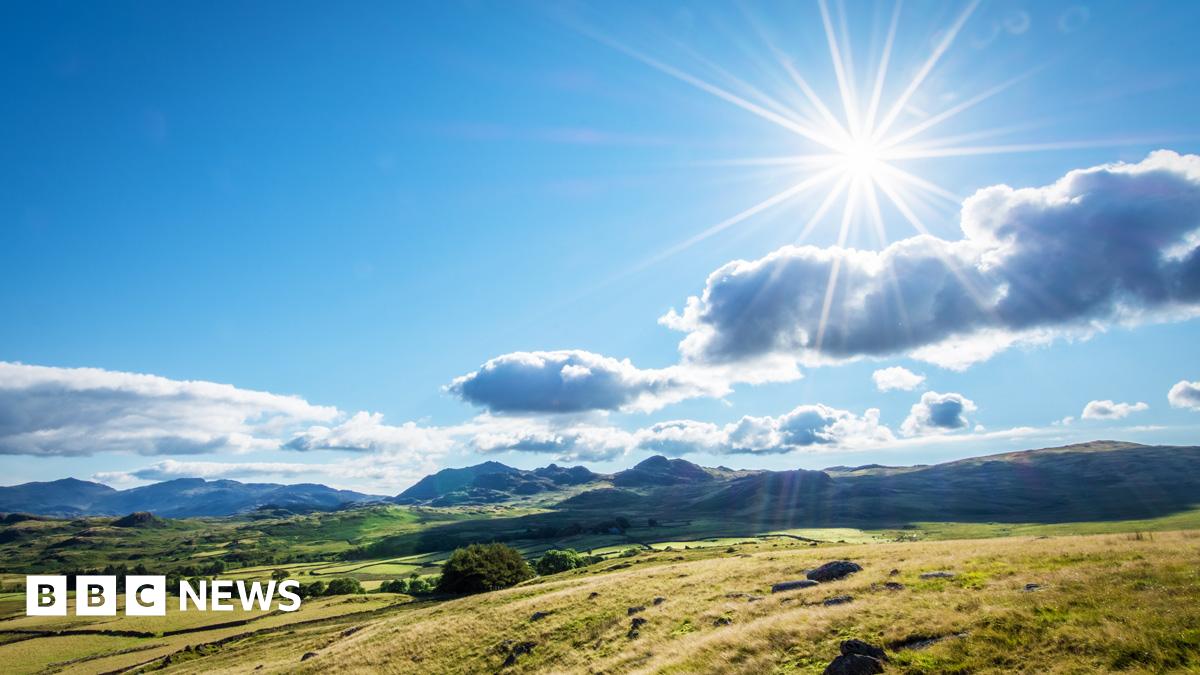The UK could experience a record UV level of nine on Thursday as the temperature continues to rise.
So what is UV and why could records be broken now?
The UV Index (or UVI) is a standard international measure of ultraviolet radiation emitted by the Sun - which penetrates the Earth's atmosphere and can cause sunburn.
Index values start at zero and then can rise above 10.
The higher the UVI, the greater the potential for damage to the skin and eyes - and also the less time it takes for harm to occur.
Levels of UV radiation vary throughout the day.
Highest readings occur in the four-hour period around solar noon, which - depending on where you are and whether daylight saving time is applied - is between 12:00 and 14:00.
Countries close to the equator can experience very high UV levels in the middle of the day throughout the year.
According to the World Health Organization (WHO),,externalNairobi in Kenya can see UV levels above 10 all year.
Majorca in Spain, will normally hit nine in June and July.
But the Falkland Islands in the South Atlantic never usually gets above five in December and January - when it's summer in the southern hemisphere.
UV levels increase in the spring across the UK, reaching a peak in late June.
In this current spell of fine weather, we could see some of the highest UV levels ever recorded.
"Normally they're about six or seven in the summer months," says BBC Weather's Matt Taylor. "Today we could hit a nine in some parts of southern England and South Wales."
This article contains content provided by X. We ask for your permission before anything is loaded, as they may be using cookies and other technologies. You may want to readX’s cookie policy,externalandprivacy policy,externalbefore accepting. To view this content choose‘accept and continue’.
There are a number of factors - not just because most of the UK is cloud-free at the moment.
"We've just passed the summer solstice so the sun is particularly high in the sky," says Taylor.
"We've also seen ozone depletion at exceptional levels across the northern hemisphere during the winter and spring, mainly due to natural weather patterns.
"And with much of the northern hemisphere being under lockdown recently, pollution levels are lower. That stops the UV being scattered quite so much."
We need sunlight to keep us in good health, but getting sunburnt from too much UV exposure - especially for fair-skinned people - isn't the only risk.
"UV is important for getting Vitamin D and keeping us healthy, but too much of it can cause skin cancer or eye cataracts," says Dr Michaela Hegglin from the University of Reading's Department of Meteorology.
"So slip into a shirt, slop on some sun cream, and slap on a hat and sunglasses during the hottest hours of the day."
And remember, the amount of UV reaching your skin is not driven by the daily temperature. UV levels on a bright and breezy late April day will be about the same as a warm sunny day in August.
"Your skin can burn just as quickly whether it's 30C or 20C," says BBC Weather's Helen Willetts. "And don't be caught out on cloudy days. UV will still penetrate thin clouds - so even if you don't think it's that sunny, you can still burn."
You should regularly apply a high factor sunscreen to prevent skin damage - especially if you are fair-skinned. You should also avoid being out in the sun during the middle of the day.
Sunglasses are also important. Exposure to UV rays has also beenlinked to serious eye conditions.
Streeting vows to keep disruption to a minimum as doctor strike begins
US and Israel condemn French plan to recognise Palestinian state
The story behind the photograph of a starving Gaza baby
The debate: Will the new age checks for porn sites do more harm than good?
The story behind the photograph of a starving Gaza baby
Artificial food colours are out, so what's next?
Too hot for Santa as Lapland buckles under record heatwave
Renée Rapp: Media training is boring, I can't give fluffy answers
Weekly quiz: Who rescued England's Lionesses against Italy?
Blood, sweat and tears: Look back at Hulk Hogan's highs and lows
'Threat to NHS from strikes' and 'UK must do more on Gaza'
Summer Essential: Your family’s guide to the summer, delivered to your inbox every Tuesday
Your first preview of the historical epic, King and Conqueror
Pink Floyd's David Gilmour shares his Desert Island Discs
Investigating the rise of medical conspiracy theories
Kelly Osbourne lost 'best friend' after Ozzy's death
Trump takes time out to open Scottish golf course
'Threat to NHS from strikes' and 'UK must do more on Gaza'
Samaritans to close more than 100 branches
Female exec captured in viral Coldplay concert clip resigns
Streeting vows to keep disruption to a minimum as doctor strike begins
Cash cards to pay for gluten-free food in UK first
Blood, sweat and tears: Look back at Hulk Hogan's highs and lows
Weekly quiz: Who rescued England's Lionesses against Italy?
Copyright © 2025 BBC. The BBC is not responsible for the content of external sites.Read about our approach to external linking.



 Education
Education 22 Jul, 2025
22 Jul, 2025 Samuel Walker
Samuel Walker